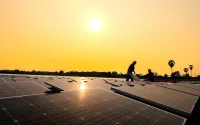14 March 2007PlanetarkJeremy Lovell
With billions of dollars pouring into emissions trading and the Kyoto Protocol's Clean Development Mechanism to cut the greenhouse gases entering the atmosphere, the world's poorest people are being forgotten in the green goldrush.
Wolfowitz said the reason for the imbalance was that while there were trading mechanisms to deal with mitigation -- cutting emissions of climate changing gases like carbon dioxide -- there was nothing similar to help people survive its effects.
"There are a lot of people concerned about mitigation. There are not that many concerned about adaptation, and adaptation is a problem in the poorest countries who are our main concern," he told Reuters at a clean energy conference in London.
"Having said that I think the big resource management issue for both the developed countries and the developing countries is going to be in the area of mitigation ... and that part of the picture will probably dwarf the other in scale," he added.
Scientists predict that average global temperatures will rise by between 1.8 and 4.0 degrees Celsius this century from burning fossil fuels for power and transport, causing floods and famines and putting millions of lives at risk.
ON THE EDGE
"If you are living on the edge, climate change can push you over," said Wolfowitz, former deputy secretary of defense under US President George W. Bush.
Carbon emissions trading is forecast to be worth some US$200 billion a year before long -- with half flowing to the developing world.
That is far more than what is currently spent on development aid but is in turn dwarfed by the US$1.5 trillion that the world spends on oil alone.
"One of the things that we are going to have to do is pay more attention to adaptation in our basis work," Wolfowitz said. "We are trying to climate-proof our own projects as far as possible.
He said he expected a major growth in public-private investment projects, with the World Bank active on both sides of the equation.
Wolfowitz, appointed as the World Bank's 10th president in March 2005, rejected the suggestion that the bank's officials had developed a reputation over decades as bankers in tuxedos who lived a rich life and were aloof from ordinary people.
"It is time our reputation caught up with what we actually do," he said. "Our feet are much dirtier."
"We are much more decentralised than we were even 10 years ago. I still think we need to be even more decentralised. More of our people should spend more of their time or even be permanently stationed in the field," he said.
"There is a change, and not just in the World Bank but in the whole development community, towards emphasising the human side of the development process. There is a much broader view of the development process now," Wolfowitz said.






